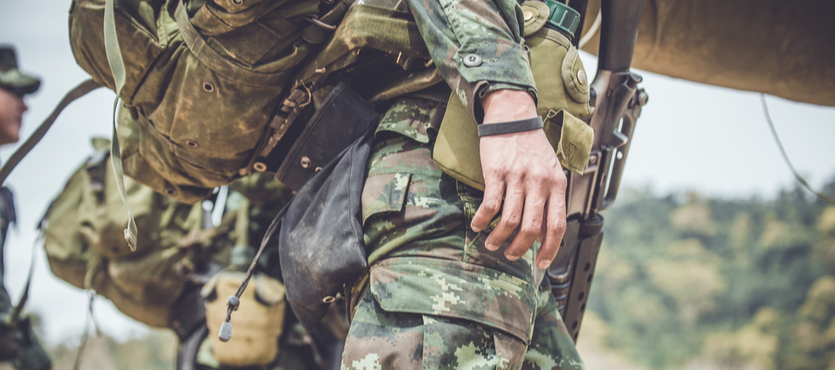In a largely symbolic move, the European Union stated that “the Wagner Group is responsible for serious human rights abuses in Ukraine, Syria, Libya, the Central African Republic, Sudan, and Mozambique.”
Furthermore, the EU blacklisted eight individuals, including former Russian Military Intelligence (GRU) officer, and suspected Wagner Group founder, Dimitriy Utkin. France was the most outspoken nation. Officials labeled the Wagner Group as a “company of Russian mercenaries which makes war by proxy on Russian account.” Furthermore, “even if Russia denies it, nobody is fooled,” they added. If Russia invades Ukraine, a move which appears likely at this time, the EU said stronger sanctions could follow.
The current sanctions, which include travel bans and asset freezes, also targeted three Syrian energy companies which are connected to the Wagner Group.
MENA Contractors
Most people associate private military contractors with the Middle East and North Africa region. Contractors serve in Iraq, Syria, Libya, and a number of other regional hotspots. If there is a “front line” in the Global War on Terror, these countries are on this line.
Combat support, like the recently-completed mission in Afghanistan, is a good example of contractor duties in MENA nations. During this conflict, contractors often provided direct combat support. They accompanied VIPs on inspection tours, escorted supply convoys, and provided security at checkpoints.
Under U.S. law, that is the upper limit of private military contractor combat operations. Unlike mercenaries, these fighters cannot participate in offensive operations.
Indirect combat support was one of the most common contractor roles in Iraq. For example, contractors often maintained bun pits. These open-air waste disposal holes have been connected to a number of serious illnesses, including cancer and breathing problems.
So far, the VA has refused to acknowledge burn pit injuries. However, the Department of Labor, which administers the Defense Base Act, has awarded benefits in these cases.
Syrian contractors played important roles in these areas as well. The non-military support these contractors offered rebel groups might have been just as valuable as the combat support. Traditionally, rebels are against something or someone. As a result, rebels often have a hard time governing countries when they take control of them.
Not all private military contractors carry machine guns. Some carry laptops and dry-erase markers. These contractors offer critical post-takeover support, ensuring that a hard-won victory is also a lasting victory.
Non-MENA Contractors
These duties often overlap in non-MENA countries, like Mozambique, Ukraine, and the Central African Republic. However, the focus is usually different in non-MENA countries where combat is not as intense.
In places like the Central African Republic, contractors often train sympathetic government or rebel forces. This training is more effective in combat, so American servicemembers are unnecessary. Additionally, many contractors are former law enforcement officers. These individuals know how to develop relationships in communities and deter aggression through visibility alone. These traits are vital in places like the CAR, where many people distrust the government.
Further south and east, Mozambique is dealing with a long-running Islamic insurgency which, so far, has been contained in the extreme northern part of the country. So, in addition to providing security in troubled areas, private military contractors provide moral support elsewhere. It is a lot easier to fight a war if you are certain you are on the right side. Government propaganda only goes so far. Sometimes, you need affirmation from someone who has been there and done that.
We mentioned security deterrence above. That is important in non-MENA nations as well. Mali is a good example. Instability is spreading in this country. As a result, many people do not feel safe on the streets. A visible yet low-key contractor patrol helps people feel better about the status quo. When that happens, they are less likely to join rebel or insurgent groups.
Injury Compensation Available
Trauma injuries, like falls, and occupational diseases, like toxic exposure illnesses, plague all these activities. These injuries often cost tens of thousands of dollars to treat. Since these incidents often occur in remote places that are far from anywhere, the transportation costs could be almost as high as the medical bills. Other ancillary medical costs include prescription drugs, physical therapy, and medical devices.
Even if the victim was partially responsible, or entirely responsible, for the incident, Defense Base Act insurance usually covers all reasonably necessary medical expenses. Sometimes, the insurance company pays these expenses directly. Most of these victims never see a medical bill. And, they are not financially responsible for any unpaid charges.
Frequently, the insurance company drags its feet in this area. That is especially true if there is any question about the extent of liability. Extended physical therapy is a good example. Usually, there is a direct relationship between the length of physical therapy and the victim’s recovery level. But many insurance companies insist on boilerplate determinations, such as three visits for a broken arm, which do not apply in all situations.
In these cases, attorneys usually send letters of protection to medical providers. Since these letters guarantee payment when the case is resolved, most providers charge no money upfront.
Attorneys often use the leverage these letters create to reduce medical bill charges. As a result, victims could get to keep more of their settlement money.
For more information about DBA wage replacement, contact Barnett, Lerner, Karsen, Frankel & Castro, P.A.

